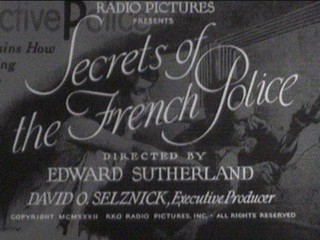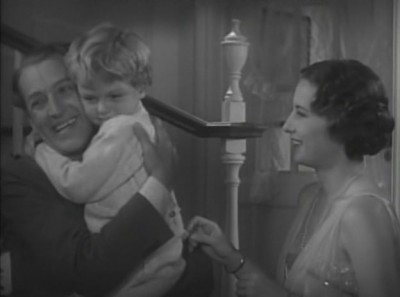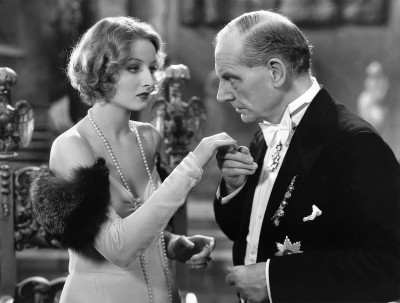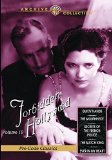| Reviews & Columns |
|
Reviews DVD TV on DVD Blu-ray 4K UHD International DVDs In Theaters Reviews by Studio Video Games Features Collector Series DVDs Easter Egg Database Interviews DVD Talk Radio Feature Articles Columns Anime Talk DVD Savant Horror DVDs The M.O.D. Squad Art House HD Talk Silent DVD
|
DVD Talk Forum |
|
|
| Resources |
|
DVD Price Search Customer Service #'s RCE Info Links |
|
Columns
|
|
|
Forbidden Hollywood V10
Forbidden Hollywood Volume 10 has five great movies from the pre-code early sound era, before censorship laws were uniformly imposed on all films released by the major studios. Warner Brothers Archive Collection's newest volume of pre-code films are nicely restored and give a good representation of the permissible transgressions allowed during the period when Hollywood was not overseen by censoring entities. Most films in the set worked well to create interesting visual elements when immobile early sound equipment hindered camera placement and movement. Then-forbidden topics about death, sex and morality in general are treated with a kind of sublime naivete that only Hollywood silent films and early talkies can achieve.

Treatment of previously taboo territory explored in Forbidden Hollywood can be summed up with a line from the opening of Guilty Hands, in which a group of men, Barrymore among them, traveling by train discuss whether or not murder is ever justifiable. Someone on the train quips, "My dear sir, we don't have morals anymore. We have the law." As the opening of the film suggests, Guilty Hands forces viewers to questions notions of right or wrong by asking whether or not the murder of his daughter's unfortunate decision to marry a lying womanizer, as it is later revealed, was responsible for the suicide of a teenager girl he was having an affair with.
In The Mouthpiece (1932), a crooked lawyer's extravagant immorality creates a nearly perfect snapshot of all that was unprohibited in the pre-code era. William plays Vincent Day, a prosecutor who becomes a defense attorney for denizens of the criminal underworld after he sends an innocent man to the electric chair. The Mouthpiece opens with the kind of breezy pacing only seen in screwball comedies when a bank clerk walks into Day's office and admits that he stole ninety-thousand dollars from the firm he works for, which he has brought with him. In breezy succession, Day manages to get the clerk off the hook while pocketing ten thousand dollars of the stolen money.
Like the question about justifiable murder in Guilty Hands, The Mouthpiece shows Day struggling with notions of right and wrong after his arc takes him through a disgraced prosecutor to crooked lawyer to altruistic defense attorney who is convinced by a simple country girl he hires aas a typist to help her boyfriend is charged with murder he may not have committed. It is helpful to think of William as the gritty antithesis to Barrymore and his melodramatic grandeur in Guilty Hands. Williams is a great actors whose work must be rescued from obscurity.
In just under an hour, The Secrets of the French Police (1932) unravels an entertainingly convoluted mystery whose optical effects and Expressionist-inspired visual style transcend its badness. The murkily written script centers around a Russian hypnotist who puts a Parisian flower girl under a spell and convinces her that she the heiress to a monarchy in order to steal millions of pounds from an English bank. The French police officers at the center of the mystery use the newest techniques to catch the flower girl girl, including making a wall-sized composite image of her made from giant puzzle pieces. For reasons that remain unclear, the French officers also employ a local criminal to help them on their search. The film isn't especially controversial by today's standards, but it is has examples of female nudity in early Hollywood films, as an entranced woman is shown lying naked in bed. Secrets of the French Police plays like David Lynch film with B-level melodrama.
Warren William returns in The Match King (1932) and plays the kind of greedy fat cat that brought America to its nadir during the Great Depression. William is Ivan Kreuger, a character who was inspired by a rea-life embezzler and crooked entrepreneur who cornered the matchstick market. Kreuger's rise and greed-drive fall serve as a cautionary tale about the peril's of unchecked capitalism. After lying about success in America, Kreuger is asked to go back to his home country of Sweden to save a floundering matchstick business. William masquerades as a kind of international playboy who cons wealthy socialites into giving him state secrets by charming them and then ditching them when he's gotten the information he needs from them.
The final film of volume ten, Ever in My Heart (1933), stars Barbara Stanwyck in a bizarre pro-German propaganda film that mixes blind nationalism with incest and love. It puts forth the unintentionally strange assertion that anti-German sentiment stirred up in the US during World War I towards immigrants from that country led to the persecution of a couple who refused to perpetuate a pure bloodline of married relatives.
Mary meets Hugo and they fall in love instantly. The only problem is that she was groomed by her bizarrely insular family to marry her cousin as a way of keeping a pure bloodline in their small town, where everyone is related.
Hugo and Mary live happy lives together until Germany invaded Belgium, after which the family-town takes a spiteful attitude towards Hugo and Mary. Their struggle is presented through a gaudy, cheap form of melodrama. As anti-German sentiment reaches a fever pitch, Hugo is fired from his job for being German, and his son is refused hospital care and ends up dying from a disease. in the End, Ever in My Heart is meant to be a cautionary tale about the dangers of xenophobia and the importance of accepting others as they are. The problem, of course, is that the film was made and takes place in a world where racism was widespread, and many other, non-white immigrants were often discriminated against.
Apparently, it didn't seem odd to the makers of the movie that their film was about a couple proud of German heritage who were persecuted because they refused to help maintain the purity of a bloodline. Without giving away too much, Ever in my Heart reaches a far-fetched conclusion that adds to the film's unintentionally funny chain of melodramatic events.


You won't be shocked by anything in Forbidden Hollywood, but watching the series is a good opportunity to discover some obscure, would-be classics.
The DVD
Video: Each disc has one film and all are presented in their original 4:3 aspect ratio. There are no digital artifacts, but scratches and splotches from the original source materials occasionally show. These minor blemishes don't detract from the viewing experience. It's amazing that Warner Bros. has been able to preserve such obscure, underrated films. The packaging and presentation of the Forbidden Hollywood series is very basic, but the real draw are the digital transfers that preserve the warmth of their original celluloid source material.
Audio: The original soundtrack preserved on each disc is clear and nicely balanced. There are no subtitles on any of the discs, and each one has only the original English language Mono track.
Extra Features: There are several theatrical trailers, but no other features.
Final Thoughts:
The real value in the Forbidden Hollywood series lies in the emergence of previously obscure, often strange movies that would otherwise remain forgotten. Against the censorship standards of today, the treatment of taboo subject matter by movies from the pre-code years seems quaint, but they often show artistry and sophisticated restraint. Or, if you just want to discover recently unearthed movies that watchable for their strangeness alone, seek out Forbidden Hollywood.
|
| Popular Reviews |
| Sponsored Links |
|
|
| Sponsored Links |
|
|
| Release List | Reviews | Shop | Newsletter | Forum | DVD Giveaways | Blu-Ray | Advertise |
|
Copyright 2024 DVDTalk.com All Rights Reserved. Legal Info, Privacy Policy, Terms of Use,
Manage Preferences,
Your Privacy Choices | |||||||













